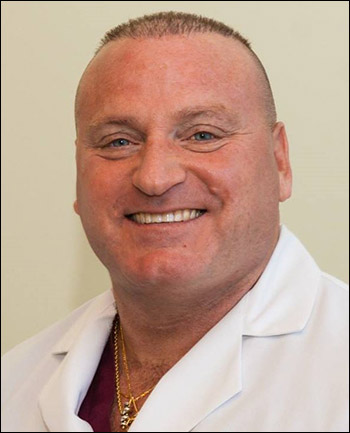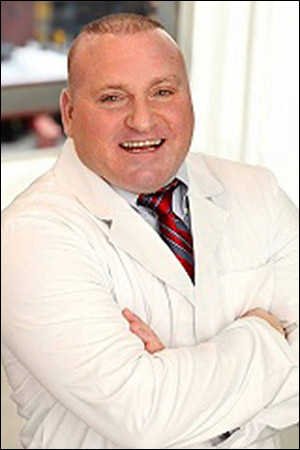

















|

Dr. Tommy:
Demystifying Medical Marijuana
By Carin Chea
Dr. Thomas G. O'Brien II (known affectionately as Dr. Tommy) is a family physician specializing in Medical Marijuana.
Located on the upper east side in Manhattan, Dr. Tommy is not defined by his mountain of accolades (which easily adorns an entire wall in his office) or his extensive knowledge of medical practices.
Dr. Tommy possesses a quality that cannot be taught in clinics or residency - the gentlest of compassion and empathy that every patient looks for upon entering a medical facility.

This is most apparent in his book Medical Marijuana: Real Life Success Stories, which chronicles the journey of 12 patients who've found healing under Dr. Tommy's care.
In a world where bedside manner in the medical profession can be cursory at best, Dr. Tommy offers something that can be easily lost in the hustle of a medical practice -- Humanity.
How did you get into the field of medicine?
As a young boy, I had a dream to either become a professional baseball player, fly jets or become a physician. I played ball until I graduated from high school. I was scouted, but standing at only 5'5", the reality of making it to the major leagues was extremely low.
As for flying jets, that was the "cool" dream of a youngster but as I got older, I realized that just wasn't for me.
Science came very easily to me, so I turned my attention from sports into academics. I focused on improving myself - my writing, reading, and presentation skills. And I realized, that as a physician, I could use my love of science to help people.
I truly admire the compassionate touch you have with your patients. There have been so many times I wish my practitioner gave me a hug. That's all we need sometimes, for the healing process to begin.
Growing up in an Irish and Italian house, hugging was a big part of my childhood. To this day, I kiss my father, my uncles, my cousins, everybody on the cheek.
As people, human touch is important and necessary. A touch provides a soothing and healing sensation, as well as shows a sign of respect. There is an emotional component when you feel a touch, you feel that energy. I'm a true believer in transferring healing energy through touch.
The first thing I do when a patient enters my exam room is say, "You can call me 'Dr. Tommy' or 'Dr. Tommy O.' It's about "us." It really is about "we" working together as a team.
You have to have a strong relationship with your physician. I treat all my patients like they're family. I'm not here to sell them something. I'm here to educate them. I also like to laugh and have fun with my patients as laughter is the best medicine.
I had a gentleman who was diagnosed with cancer and you could just see on his face that his world dropped out. He was getting ready to break down. So, I said, "stand up." I gave him a hug. I told him, "Give me a real hug, an embrace." I told him, "You're going to be okay. We'll work through this together."
At the end, he was tearful. He said, "Doc, I really needed that."

As a family physician, how did you specifically come to specialize in the field of Medical Marijuana?
As a family practitioner - before I became a physician, my mentors told me I needed a Master's in Nutrition. I take a holistic and natural approach to treating my patients.
The first thing I do is not push the pill. I try to treat with behavioral modification, diet, and exercise. I've been doing this since the mid-1990s.
One of my colleagues reached out to me and told me, "New York State is going to pass the Compassionate Care Act, and you'll align well with this with the way you practice." It's a very natural approach and fits what I practice.
In July 2014, NY state legalized the use of medical marijuana (which is the Compassionate Care Act), and it went into effect January 2015. That's when I opened my doors.
I'm the first in New York City to open up my own practice specializing in medical marijuana. I've certified over 1200 patients now.
You have a published book currently on Amazon: Medical Marijuana, Real-life Success Stories. What was the impetus to write this book?
I've always wanted to write a book. Being a physician and traveling the country to do my rotations - I have a lot of experience and exposure. I wanted to write a book offering my experience and what patients go through.
Around year 3, I decided to write a book about the success stories of my patients who were using medical marijuana.
The drive behind it was the success stories. People need to know about it. The state of New York is not marketing and letting patients know that the Compassionate Care Act exists. I wanted to educate the global family.
Your book has a focus on 12 specific patients. What was it about these 12 patients that made them stand out and be a good fit to be featured in your book?
I picked cases that represent a large percentage of the population. A lot of people out there have Irritable Bowel Syndrome, Crohn's Disease, and chronic pain, so I just wanted to address the most popular issues that connect with the majority of the population.
I had one patient who was in pain and had seen multiple doctors. Every time a medication was prescribed, there would be side effects, so another physician would prescribe a medication to offset the first medication. The patient was being slowly intoxicated from medication.
There's something called a therapeutic window; it's the amount of medication in a serum level that is in the most effective range. If you're below the therapeutic window, it's sub-therapeutic, meaning you don't have enough medicine in your blood stream to do its job.
If you have too much medicine, we call it the "toxic" range. You start to see the side effects, which is now really pronounced. This patient was in a toxic range.
The patient's personality had changed. His head was down. There was no eye contact. No movement - like a zombie. The family member was with them and did all the speaking.
I said, "Give me a little time." After a few months, the patient literally came strolling through the door and said, "Hey doc!" It was a tremendous difference. People needed to know this story. So many people are suffering from this.
Why do you think medical marijuana still faces such a negative stigma?
Medicinal cannabis is not like recreational marijuana. I wanted the reader to know that there is a difference between the two. In my book, I refer to Sean Penn's character (who is high all the time) in Fast Times at Ridgemont High, and state that it's a common misconception. Medicinal cannabis is not like that.
On the cannabis plant, you have the flower (or bud) and the stem. The stem is industrial hemp. The stem is CBD, which is the non-psychoactive component of the cannabis plant. You can make jeans and rope and shirts out of it. The stem is not something you're going to get high from.
The bud, the flower, is THC, which has the psychoactive properties. Medicinal marijuana is CBD dominant, and recreational marijuana comes from the THC. Medicinal marijuana has a different ratio between the CBD and THC, and it's much lower than the recreational marijuana.
A part of why medical marijuana still has a stigma is that very few people (even in the government) aren't educated on how the different strains work.
What inspires you? I mean this open-endedly: What inspires you as a physician and as an author?
The challenge: Taking a non-compliant patient and seeing them through to the end when they smile and are different. I say, "This is you. This is who you're supposed to be."
It's look, listen, and feel: You look at them. You listen, and then you feel them physically and emotionally. It takes time. I'm willing to take my time with my patients.
Do you have any follow-up books or upcoming projects you'd like us to know about?
I have enough material for volume II. After I wrote this book, I had several patients come up to me and say, "Can you tell my story?" Six months from now, I'd like to have this book out.
I didn't talk much about me in the first book. In the first book, I wanted to educate people how medical marijuana works. It's almost like a textbook.
For more information visit: DocTommy.com
For more information on Dr. Tommy, the doctor with the compassionate touch, please visit DocTommy.com
Home |
Actors/Models |
Art |
Books |
Dining
Film & Video |
Food & Wine |
Health & Fitness
MediaWatch |
Money and Business |
Music |
Profiles
Professional Services |
Sports |
Style & Fashion
Technology |
Theatre |
Travel & Leisure
Copyright 1995 - 2024 inmag.com
inmag.com (on line) and in Magazine (in print)
are published by in! communications, Inc.
www.inmag.com
|


Advertiser Info
Subscription Form
Contact Us
|



